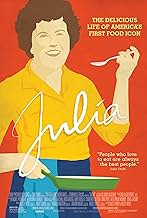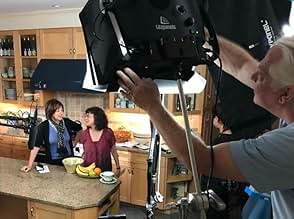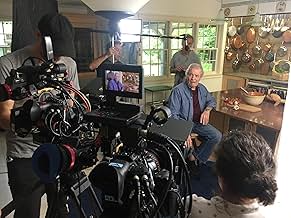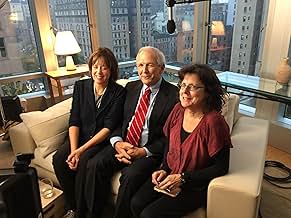NOTE IMDb
7,6/10
1,3 k
MA NOTE
Ajouter une intrigue dans votre langueJulia tells the story of the legendary cookbook author and television superstar who changed the way Americans think about food, television, and even about women.Julia tells the story of the legendary cookbook author and television superstar who changed the way Americans think about food, television, and even about women.Julia tells the story of the legendary cookbook author and television superstar who changed the way Americans think about food, television, and even about women.
- Récompenses
- 12 nominations au total
Julia Child
- Self
- (images d'archives)
Avis à la une
Thoroughly enjoyed. To the point and no time wasted repeating the same info several times. The story is very interesting to anyone who enjoys cooking.
Julia Child was such a larger than life person that it's no surprise that she has had a theatrical film (JULIE & JULIA) and a current TV series (HBO's Julia) made about her in the years since her passing. JULIA is a feature documentary that sort of bridges the gap between those two projects.
Directed by RGB filmmakers Julie Cohen and Betsy West JULIE paints a pretty clear picture of Child's life story. Like RGB, this plays very much as an authorized biography (Child's books and her foundation are credited) so don't expect too much in the way of deep critique; Although it is mentioned that Child wasn't the greatest in sharing credit with her co-authors on her breakthough book, Mastering The Art Of French Cooking. Child was also seen as slow to accept social progress and modern cuisine.
Child (who was also a local hero in Boston where her PBS show originated) is seen as a lively presence who was both driven by her evangelizing over her cooking and a devoted wife. Indeed, JULIA is really two love stories: with her husband, Paul Child and with French Cooking (well, maybe three - Butter!).
Directed by RGB filmmakers Julie Cohen and Betsy West JULIE paints a pretty clear picture of Child's life story. Like RGB, this plays very much as an authorized biography (Child's books and her foundation are credited) so don't expect too much in the way of deep critique; Although it is mentioned that Child wasn't the greatest in sharing credit with her co-authors on her breakthough book, Mastering The Art Of French Cooking. Child was also seen as slow to accept social progress and modern cuisine.
Child (who was also a local hero in Boston where her PBS show originated) is seen as a lively presence who was both driven by her evangelizing over her cooking and a devoted wife. Indeed, JULIA is really two love stories: with her husband, Paul Child and with French Cooking (well, maybe three - Butter!).
I'm surprised that on 18 Dec 2021 I'm only the third person to review this movie. And the first two reviews read very much as if they were written by the pr company handling the marketing of this film. Unlike them, I don't think this is the greatest thing since sliced bread (which wasn't so great), but it's a very fine documentary that does a solid job of presenting the life and achievements of a very interesting American woman.
It starts out not slow, but somewhat bloated. There is too much unnecessary filler, and too many people exaggerating both how bad American home cooking was in the 1950s and 60s and how much Child changed Americans' way of life.
Child grew up in an America where the wealthy, such as her family, had cooks, so that the wife did not herself get involved with daily meal preparation. The rest of American housewives did not, by and large, see cooking as a chance to be creative and develop their own personalities.
My mother, for example, only relied on frozen tv dinners as a last resort, unlike what you see in the tv ads from the 50s in this movie. She, like most American housewives of the 50s, felt they were shortchanging their husbands and especially children if they did not provide a home-cooked meal every night. I still make some of her recipes, and they are still good.
Child's real innovation was not, therefore, that she convinced American housewives to actually cook dinner: they were already doing that. She introduced the French idea of cooking as an art. Housewives certainly took pride in presenting good meals to their families before her, but the range of what they cooked was more limited, and the recipes were not that fancy. It was pretty much meat, potatoes (or pasta), and veggies. The highest praise was that it was filling.
Child gave women-middle and upper-class women, at least-the idea that there could be something intellectually rewarding about preparing a variety of different dishes. Going past meatloaf could be rewarding, even if hubbie was perfectly satisfied with it.
Once we get past that part of the movie and into Child's life, it's really pretty much all gravy. I was amazed at all the photos and home movies the staff found, some even of intimate moments. (I gather Child's husband, Paul, set up cameras in their homes to take pictures of them together.) The talking heads in the center of the movie know what they're saying, speak authoritatively, and don't go off on dithyrambs of encomia.
If you want real detail on how Child wrote her first, best-known book, Mastering the Art of French Cooking, you'll need to read her book about her life in France, which is a great read. 90 minute documentaries can't get into that sort of detail.
On the other hand, this documentary does a nice job of covering other, non-culinary aspects of her life, such as her support of gay and abortion rights.
Good use is made of both diaries and letters.
In short, a very fine movie.
It starts out not slow, but somewhat bloated. There is too much unnecessary filler, and too many people exaggerating both how bad American home cooking was in the 1950s and 60s and how much Child changed Americans' way of life.
Child grew up in an America where the wealthy, such as her family, had cooks, so that the wife did not herself get involved with daily meal preparation. The rest of American housewives did not, by and large, see cooking as a chance to be creative and develop their own personalities.
My mother, for example, only relied on frozen tv dinners as a last resort, unlike what you see in the tv ads from the 50s in this movie. She, like most American housewives of the 50s, felt they were shortchanging their husbands and especially children if they did not provide a home-cooked meal every night. I still make some of her recipes, and they are still good.
Child's real innovation was not, therefore, that she convinced American housewives to actually cook dinner: they were already doing that. She introduced the French idea of cooking as an art. Housewives certainly took pride in presenting good meals to their families before her, but the range of what they cooked was more limited, and the recipes were not that fancy. It was pretty much meat, potatoes (or pasta), and veggies. The highest praise was that it was filling.
Child gave women-middle and upper-class women, at least-the idea that there could be something intellectually rewarding about preparing a variety of different dishes. Going past meatloaf could be rewarding, even if hubbie was perfectly satisfied with it.
Once we get past that part of the movie and into Child's life, it's really pretty much all gravy. I was amazed at all the photos and home movies the staff found, some even of intimate moments. (I gather Child's husband, Paul, set up cameras in their homes to take pictures of them together.) The talking heads in the center of the movie know what they're saying, speak authoritatively, and don't go off on dithyrambs of encomia.
If you want real detail on how Child wrote her first, best-known book, Mastering the Art of French Cooking, you'll need to read her book about her life in France, which is a great read. 90 minute documentaries can't get into that sort of detail.
On the other hand, this documentary does a nice job of covering other, non-culinary aspects of her life, such as her support of gay and abortion rights.
Good use is made of both diaries and letters.
In short, a very fine movie.
I love Julia. Everyone loves Julia.
It's too bad that the director made it a political piece for today, when Julia was not trying to make a political stand for the year 2021. All she wanted was to inspire cooks 1912-2004. Please let cooking be about food, not politics.
It's too bad that the director made it a political piece for today, when Julia was not trying to make a political stand for the year 2021. All she wanted was to inspire cooks 1912-2004. Please let cooking be about food, not politics.
The love, enjoyment and wonder that filled the life of this remarkable lady is shared and felt as you watch and listen. It also makes plain that the (mostly) well intentioned parodies of her voice, mannerisms and actions are as much a pale imitation of her as the various attempts to showcase her achievements and impact. This film does a wonderful job of seeing her as she seemingly was. What she felt, how she felt and what she did and why. Watch and enjoy and share the love.
Le saviez-vous
- AnecdotesJulia was the eldest of three siblings and at 6' 3" the shortest. John, second eldest, was 6' 4" and Dorothy, the youngest, was 6' 5".
Meilleurs choix
Connectez-vous pour évaluer et suivre la liste de favoris afin de recevoir des recommandations personnalisées
- How long is Julia?Alimenté par Alexa
Détails
Box-office
- Montant brut aux États-Unis et au Canada
- 399 811 $US
- Week-end de sortie aux États-Unis et au Canada
- 18 010 $US
- 14 nov. 2021
- Montant brut mondial
- 493 080 $US
- Durée1 heure 35 minutes
- Couleur
- Mixage
Contribuer à cette page
Suggérer une modification ou ajouter du contenu manquant



























